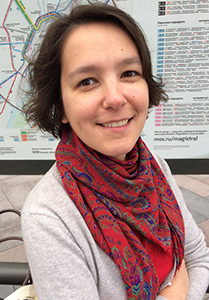Every Atom | No. 31
Introduction to Every Atom by project curator Brian Clements
Whitman's work was to have a long and highly influential run in Russian translation, which began, like many enterprises thought to be of potential benefit to the Russian people, with a proposal by an Irishman. Mr. John Fitzgerald Lee, born in County Galway, and a student at Trinity College, wrote to the Bard on November 28, 1881, “I am an ardent student of the Russian Language, and greatly interested in the huge country and its strange people and history. Your book is the book for them. Will you allow me to translate the Leaves of Grass into Russian. It will do good, of that I am perfectly sure.”
Whitman's reply was prompt and enthusiastic:
Your letter asking definite endorsement to a translation of my Leaves of Grass into Russian is just received, and I hasten to answer it. Most warmly and willingly I consent to the translation, and waft a prayerful God speed to the enterprise.
You Russians and we Americans;—our countries so distant, so unlike at first glance <…>—and yet in certain features, and vastest ones, so resembling each other. <…> [T]he idea, perennial through the ages, that they both have their historic and divine mission—the fervent element of manly friendship throughout the whole people <…> are certainly features you Russians and we Americans possess in common.
The exchange remains a footnote in history, as Mr. Lee never did complete his translation. It was, however, known to Kornei Chukovsky (1882-1969), the Soviet translator who would produce five editions of Leaves of Grass along with extensive critical studies and thus would deliver Whitman into the Russophone literary canon. We are now in a much better position to interpret what Whitman may have meant by “manly friendship,” but the idea struck its own chord in Chukovsky's time. Chukovsky’s own poetic sensibilities can best be characterized as avant-gardist; this is considered by biographers one of the reasons for which Chukovsky’s talent as a poet was conscribed to children’s verse in the Soviet era. Whitman's omnivorousness, this lust for earth, weather, emotion, for men and women, for Chukovsky, whose first translation of Leaves of Grass came out in 1919, was precisely the revolutionary force that enabled Whitman to advance to a new form of romance, one that would replace the bourgeois cult of the Fair Lady with “the cult of the Comrade, the cult of the democratic friendship, because people's hearts fill more and more with this new tenderness, the fondness for the colleague, co-worker, fellow traveler, for the one who walks in step, shoulder to shoulder with us, who is a part of our common march.” [1]
Fervent proclamations of brotherly love notwithstanding, Chukovsky, and most Russian translators of Whitman before and after him, struggle to handle Whitman's ambiguities, including in this section of “Song of Myself.” The Russian grammar requires that pronouns, nouns, adjectives, and some verbs be gendered.
In this section, Chukovsky translated the “loving bedfellow” as любовница, a female lover (mistress), and reinforced this in his rendering of the line, “That they turn from gazing after and down the road” as “That, having glanced down the road after my sweetheart.” According to Ed Folsom's commentary, the “loving bedfellow” that sleeps at Whitman’s side was, in the original version of “Song of Myself,” identified as “God.” God is, for Whitman, an affectionate companion who, each morning, leaves him baskets of surprise, pregnant with possibilities. In this case, the choice of the word “bedfellow” makes infinitely more sense for Whitman: bedfellow primarily refers to a person of the same sex sharing the bed for the purposes of warmth and convenience. The implication of a sexual partner weakens the focus of the section, dilutes the sense of equivalence between the embodied speaker and the procreative mystery.
In Whitman's own language, the powerful “I” never ceases its hold of the gravitational center, the source of the gaze, the nucleus from which the speaker reaches out to consider the subject, be it the generic “women” or the intimate “you.” Pulled into this undiscriminating orbit, all things become de-personalized; they are first and foremost the objects of longing or desire, and their gender identification is often secondary. The Anglophone reader, if so inclined, is at liberty to assign hetero- or homo- vector to the sexuality expressed in “Children of Adam,” and specifically to the arch of desire narrated in “One Hour to Madness and Joy.”
The Russophone reader, regrettably, is yet to be granted such freedom.
(1) Kornei Chukovsky, Uot Uitmen: poeziia gradushchei demokratii/Walt Whitman: the Poet of the Future Democracy, Petrograd: Izd. Petrogradskogo Soveta rabochikh i krasn. deputatov (1919), 37.
Recommended
Nor’easter
Post-Op Appointment With My Father
Cedar Valley Youth Poet Laureate | Fall 2024 Workshop







